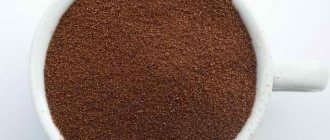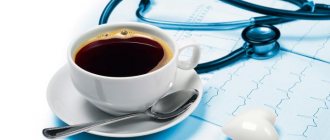Quite often there are situations in which a favorite drink only brings discomfort after drinking it. General health deteriorates significantly, nausea and even vomiting appear. Coffee is no exception. Deterioration of the condition may indicate the development of some disease of the internal organs. So why does coffee make you sick and how can you deal with it?
Effect of coffee on the body
Coffee can have both beneficial and harmful properties. The appearance of severe nausea can be triggered by the negative effect of caffeine on the condition of the body as a whole. Caffeine itself is a fairly strong stimulant of the nervous system.
Its high content in the body can lead to dehydration. As a result, nausea develops.
In addition, caffeine greatly irritates the walls of the stomach, which has a negative effect on its digestion.
The beneficial properties of coffee are that this drink tones and gives strength. But it is quickly addictive, which is already a negative factor. The amount of coffee a person drinks per day also matters. If it exceeds the established norm, then nausea appears and diseases of the digestive system develop.
How does coffee affect the gastrointestinal tract?
The effect of coffee on the appearance of nausea can be explained, first of all, by the fact that this drink quite irritates the mucous membrane of the gastrointestinal tract. This often results in diarrhea and nausea.
After coffee enters a completely empty stomach, increased production of pure hydrochloric acid begins in the digestive tract. It is usually used to break down food.
A true drink made from coffee beans, drunk on an empty stomach, often provokes disturbances in the digestive processes and a small breakdown of protein structures.
Unbroken protein causes the most basic stomach problems. Nausea begins after coffee, severe bloating appears. Irritable bowel syndrome develops, which often leads to gastritis and chronic peptic ulcer disease. In some cases, colon carcinoma may develop.
How to drink coffee without feeling anxious?
To do this, you should follow these tips:
- Scientists recommend not to abuse coffee; it is permissible to take up to 400 ml of this drink per day.
- If a person has minor mental disorders, it is worth understanding that frequent drinking of coffee can aggravate the situation.
- Those who find themselves in frequent stressful situations are also recommended to replace traditional strong coffee with lighter drinks, such as turmeric latte, Japanese matcha, chicory, cocoa, etc. But even in this case, you should not expect miracles if your rhythm of life still hasn't changed, and you still sleep 3-4 hours a day.
- You should not drink coffee before bed, as after this you will suffer from insomnia. To avoid this, you should drink a cup of drink at least an hour before going to bed. During this time, caffeine will have time to be absorbed by the body.
In addition to the tips listed above, you need to reconsider your views on lifestyle. Try to rest more, play sports, but do not overload your body. Positive emotions also have a beneficial effect on the psychological state. Anxiety can be eliminated with the help of sedatives, but they must be prescribed by a doctor.
Possible causes of nausea
If nausea from coffee is constant, then it is very important to understand the reasons for this condition. There are several main factors that can trigger the appearance of such a symptom:
- high blood pressure;
- gastritis;
- coffee overdose;
- poor quality coffee;
- Drinking a large amount of drink on an empty stomach.
Nausea may occur if there is a sharp increase in blood pressure. In small quantities, coffee only increases the initial elasticity of blood vessels, but in large doses, hypertension can develop. In such cases, in addition to nausea, severe dizziness also appears, vision darkens, and heart rate increases. If a person does not drink coffee drinks, then such symptoms will be a manifestation of poor nutrition and lifestyle disorders.
What to do if you feel nauseous after coffee
If nausea often occurs after drinking coffee, you need to contact a gastroenterologist as soon as possible in order to undergo a full examination and find out the exact cause of this condition.
To prevent the occurrence of an unpleasant symptom:
- it is necessary to pay special attention to the quality of the coffee drink being consumed;
- It is better to drink coffee with a small amount of milk. This will help reduce its initially high acidity;
- you cannot drink more than 2 cups of drink per day;
- It is forbidden to drink coffee on an empty stomach;
- you need to wash it down with a cup of regular boiled water;
- In case of a severe overdose of caffeine, it is necessary to remove it from the body as soon as possible. To do this, use activated carbon or do gastric lavage.
In some cases, folk recipes help. Strong tea made from chamomile and St. John's wort will better help reduce the negative effects of caffeine on the body. A glass of plain, clean water will help you cope with mild nausea. In this case, the body is saturated with energy, and the symptoms of dehydration quickly disappear.
Hypertension and caffeine
According to the expert, taking caffeine or other caffeine-like products to people suffering from hypertension can cause irritation and severe headaches. Heart palpitations may also occur. This all happens because there is no universal pressure, and each body reacts to caffeine differently. People suffering from hypertension should be careful not only with coffee, but also with painkillers, which often contain caffeine. This is an important issue, especially for headaches, which are treated with the right dose of coffee.
You can adapt to caffeine and thus become resistant to it. Moreover, drinking five or even six cups of coffee daily, caffeine can cause the opposite reaction to the desired one, that is, cause drowsiness, says Andrzej Rutkowski. Excess of this substance can sometimes make headaches worse. According to the specialist, we are talking about the depletion of certain receptors, which leads to the so-called paradoxical effect.
According to Caffeineinformer.com, a website devoted to the effects of caffeine on the human body, coffee headaches have their own distinctive signature. The soreness begins behind the eyes and moves toward the forehead, and as it progresses, it can cause severe migraines. Such illnesses can occur in people who undergo caffeine detoxification, drink excessive amounts of coffee, or, paradoxically, do not drink their daily dose of caffeine.
Coffee and blood pressure
If you are hypertensive and your blood pressure is fluctuating, you absolutely need to monitor its normal level. Coffee can cause sudden surges in blood pressure, which can lead not only to health problems, but also to death, which is why it is so important to monitor blood pressure readings. Tonometers will help you with this, which you can buy on the website of our online store Orthosalon or in the Medtechnika Orthosalon chain of stores in your city.
There are several types of tonometers:
- Mechanical;
- Semi-automatic;
- Automatic.
With the help of a tonometer, you can always monitor your blood pressure in a timely manner and take measures to normalize it. In addition to the mechanical one, in our Medical Equipment store in Kharkov, Kiev, Dnepr, Odessa, Lvov and other cities of Ukraine, you can also choose and buy an automatic tonometer, which is an innovative means of measuring pressure and has a number of wide and useful functions, such as: measurement heart rate, calculation of the average value of the results, voice guidance, date and time display and many others. We work only with the world's leading brands, so we confidently guarantee you the quality of the products we provide. If you decide to buy a tonometer, it’s time to visit Medtekhnika Orthosalon.
Contraindications for drinking coffee
When consumed correctly, coffee can add pep to your spirit, improve performance and lift your mood. Adding lemon to it will help reduce the harmful effects of caffeine.
If you drink more than 5 cups of coffee a day, such a large amount of caffeine can lead to serious health problems. There are also categories of people for whom drinking this drink is generally contraindicated:
- Hypertension. If you have high blood pressure, coffee is most harmful. Caffeine exacerbates the stress on the cardiovascular system.
- For people who suffer from insomnia, it is important to know that the effects of caffeine begin approximately 15-20 minutes after drinking a cup, and it is cleared from the body within at least a couple of hours.
- Coffee is harmful for gastrointestinal diseases. The acid contained in it irritates the mucous membrane of the stomach and intestines, which leads to an exacerbation of chronic ailments. If you drink it on an empty stomach, heartburn very often appears.
- Pregnancy and breastfeeding are direct contraindications to drinking coffee due to the risk of premature birth.
- Caffeine promotes the rapid growth of cysts, therefore it is contraindicated in women with polycystic ovary syndrome.
- Coffeestol, found in grains, affects the increase in cholesterol levels because it acts directly on the receptors of the cellular structures of the intestine, which are responsible for transporting bile processed in the liver.
- Coffee strongly leaches essential elements such as calcium, potassium and phosphorus from the body. Therefore, it is contraindicated in acute osteoporosis.
- The drink significantly dilates the coronary vessels and disrupts normal heart rhythm, so it should not be drunk by people who suffer from tachycardia and arrhythmia.
If you drink too much coffee, side effects may include nausea, dizziness, and insomnia. This happens because all processes in the body are disrupted, the nervous system is excited, blood pressure rises, and heart problems begin. If you cannot give it up at all, it is advisable to reduce consumption to a minimum.
If a person notices that he feels sick after drinking coffee, doctors advise paying attention to the amount of coffee he consumes, as well as the frequency of unpleasant symptoms. This condition may indicate the presence of certain chronic diseases. They require medical intervention.
If any serious diseases of the gastrointestinal tract are detected, then the consumption of coffee drinks will need to be minimized.
What to do if you feel sick from coffee?
If every time you drink coffee you feel bad, you should either seriously reduce the dose, or try decaffeinated coffee, or maybe even give it up altogether. But usually it happens bad once, almost by accident, and in this case there is no need to panic: usually everything goes away in about 15-20 minutes. If you feel nauseous, you can try to get rid of the drink you drank; if not, there are ways to help your body return to normal faster:
- If you feel weakness, dizziness, tachycardia, pain in the head, it is advisable to sit down or lie down, ensure an influx of oxygen, perhaps raise your legs above your head so that oxygen flows to the brain. If it's freezing, you can wrap yourself up.
- If there is pain in the heart, increased excitability, pain in the temples, rapid pulse, fever, provide access to air and try to do a few physical exercises, just to speed up the metabolism and the caffeine is processed faster.
In any case, it is good to drink water, you can eat a banana, drink milk. Lemon water may help. Possibly sedatives for the heart and blood vessels.










